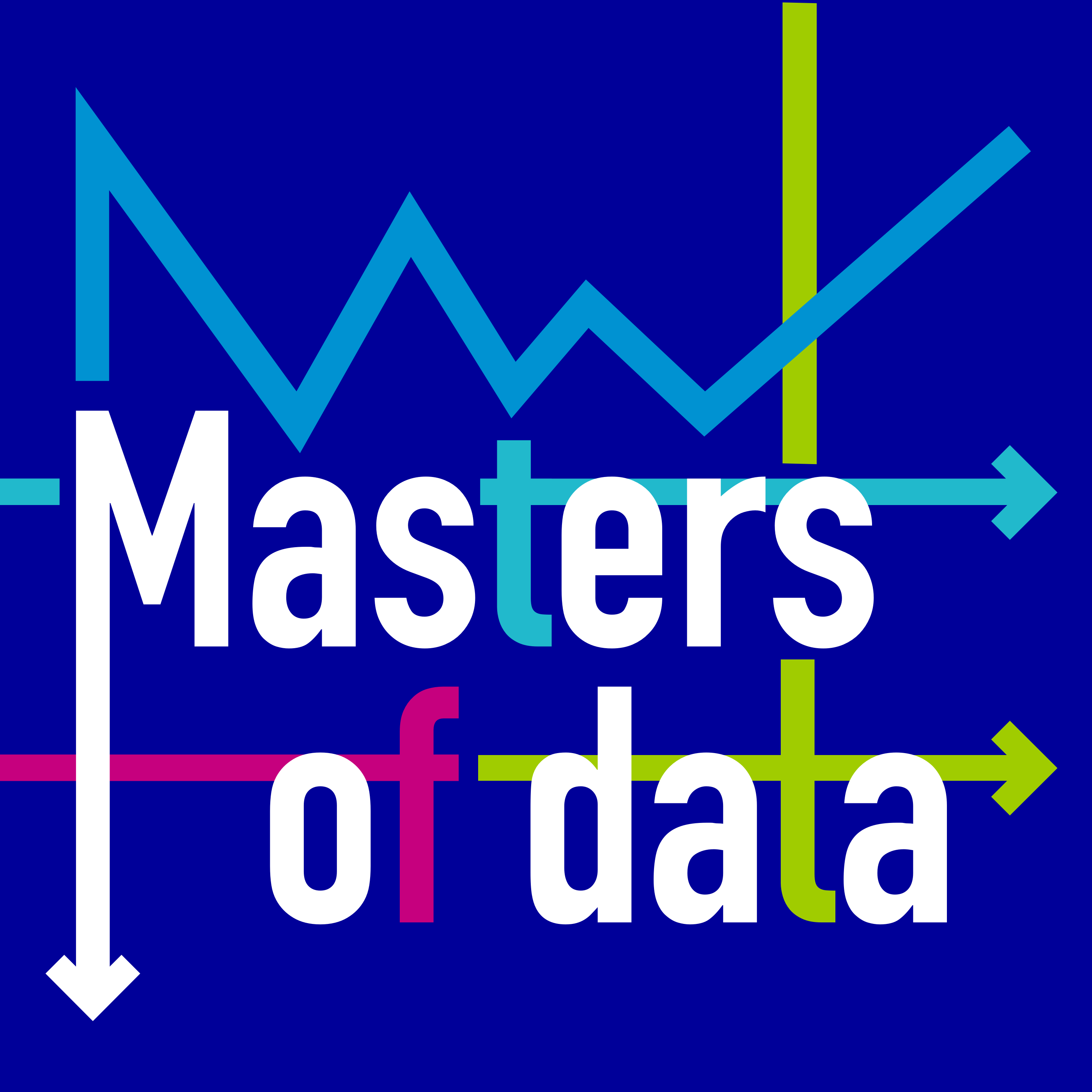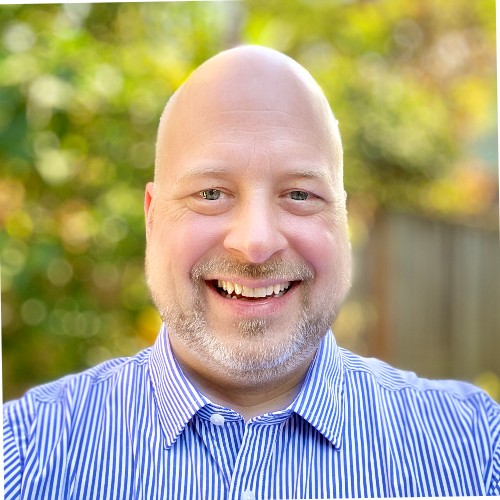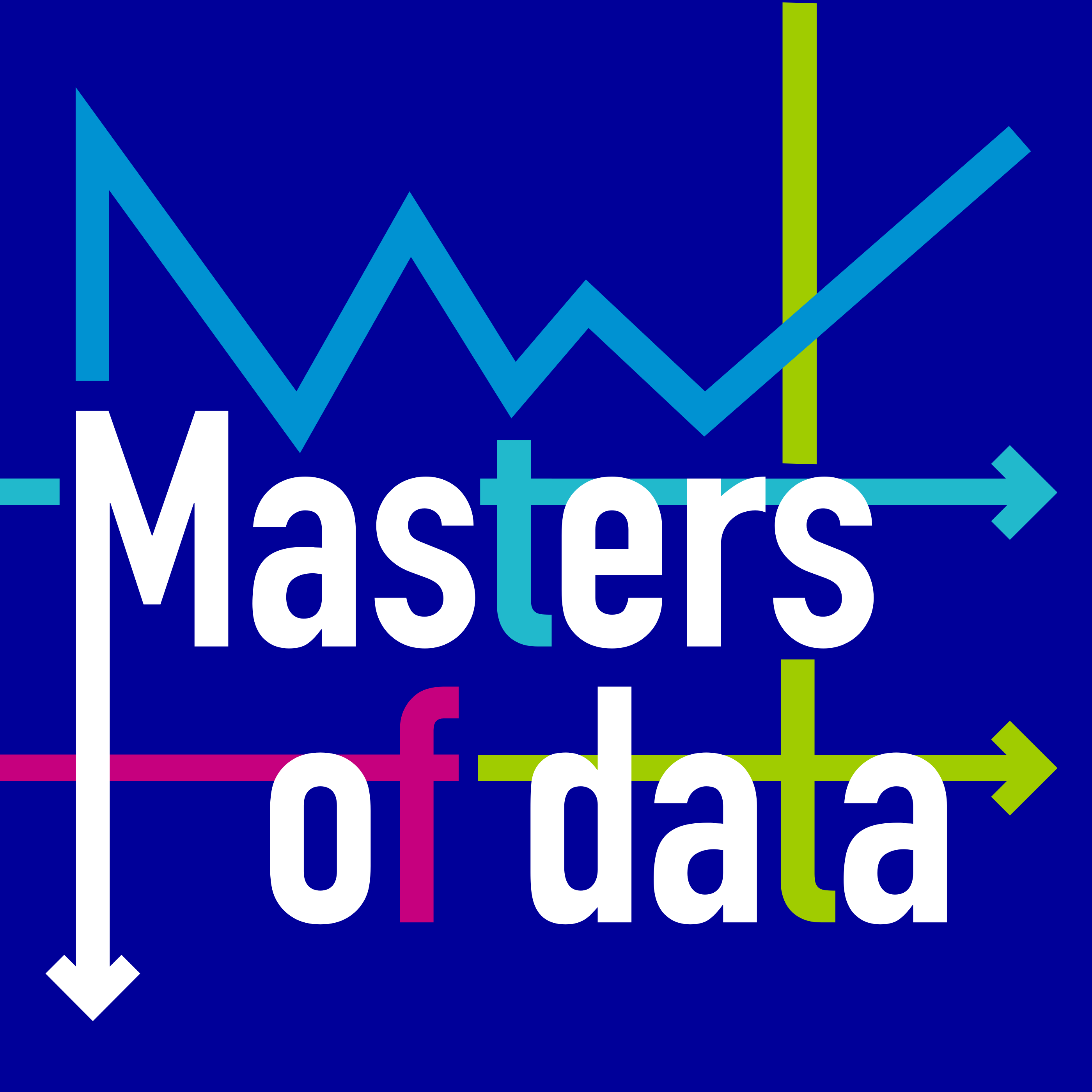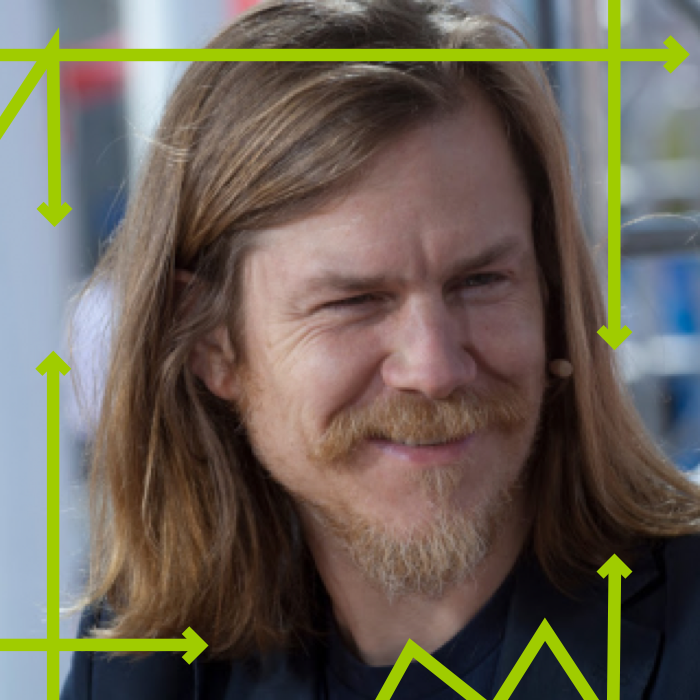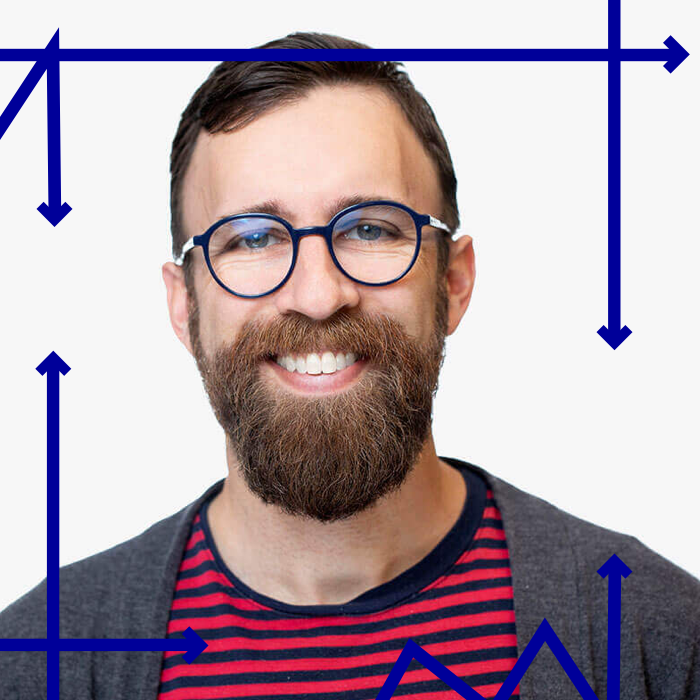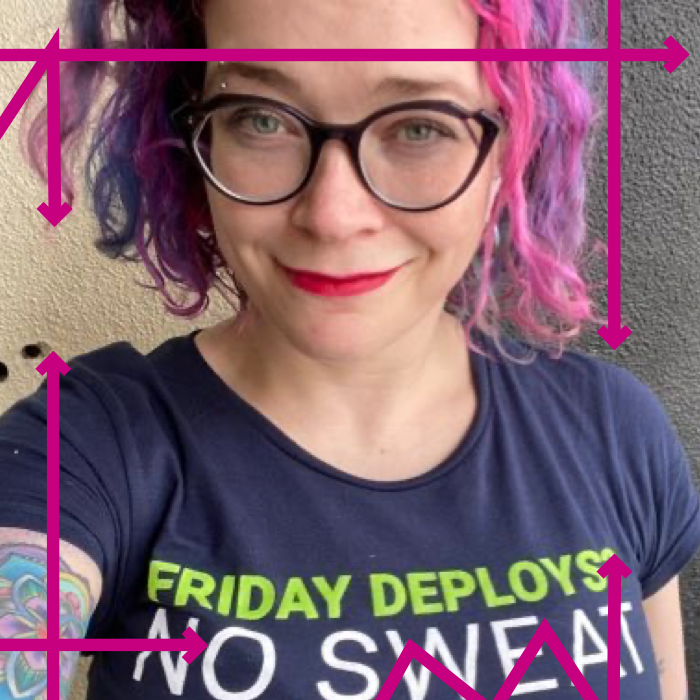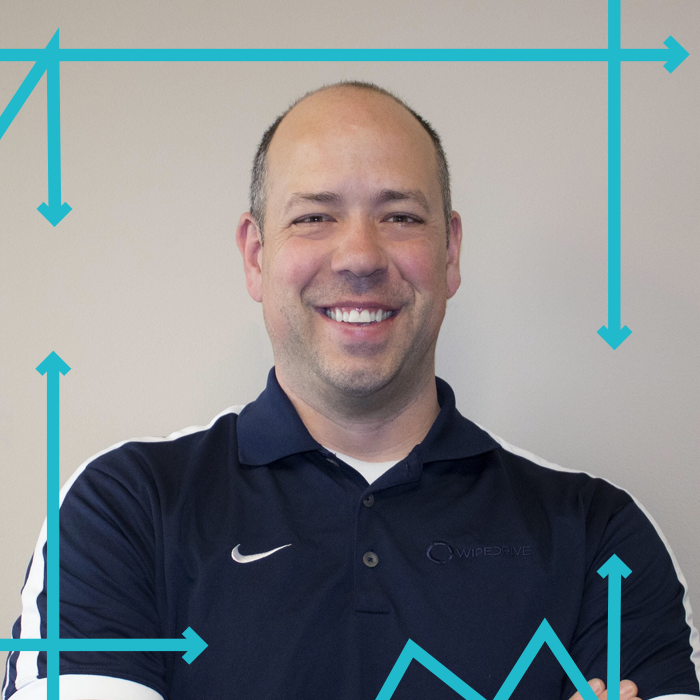The Most Connected Man on Earth (Guest: Chris Dancy)
- 0.5
- 1
- 1.25
- 1.5
- 1.75
- 2
Ben: Welcome to the Masters of Data podcast, the podcast that brings the human to data and I'm your host Ben Newton. I met our guest today several years ago asking for his advice on navigating the world of social media and one thing is for sure, Chris Dancy always leaves an impression. Chris became known as the most connected man on earth by wrangling the hardware and data for over 700 sensors, devices, applications and services that tracked and analyzed his life. He is a well-known speaker, consultant and thought leader, now he's written a book called Don't Unplug. In today's world awash in data it makes sense to have a conversation with a guy who's the most comfortable swimming in a sea of data. So without any further ado, let's dig in.
Ben: Welcome everybody to Masters of Data and I'm really excited to have Chris Dancy with me here today. Welcome Chris.
Chris: Thank you Ben.
Ben: Chris, when I was looking back and we've known each other for few years but I was looking back and this whole most connected man on earth, what's the origin story here? Tell me a little more about you got that moniker at one point?
Chris: I think it was 2013, I had done a television interview when I worked at BMC Software and at that television interview, the reporter named Corey referred to me as the world's most surveilled person. About six months later I was doing a piece for the Wall Street Journal and they fubbed up surveilled and actually referred to me as connected. I think there's a lot of algorithmic magic in this because slowly over time it became most connected person on earth, then I was most connected man and today you can literally in almost any country, I think I've counted 30 odd countries, you can just type most connected and I come right up.
Ben: Oh really?
Chris: Yeah. I'm going for most, that's my 2018 goal, just put in most in a browser and I come right up.
Ben: Well you know I have to say that connected sounds a little better than surveilled. Surveilled sounds pretty government, big brother.
Chris: I know.
Ben: I was looking back at some of the numbers, I mean partly the reason why you got this name is because I was seeing 700 sensors, devices and applications you had watching your body, who you are at one point in time. I mean what was it like?
Chris: Let's be honest, there's a lot more than that currently. So I guess you could ask me what is it like. Let's go a step further, there's probably even more watching most of your listeners. The reality is we don't think about how connected we are and we only notice we're connected when the interdependencies either fail or create conflict. The connections in our life that actually make things work we don't notice, you know when things just happen for us and it seems almost like magic. But I'd say if you're being very specific about what is it like to wear a lot of technology and do a lot of purposeful logging, it's difficult. The first level of difficulty is just battery. I mean you have to walk around constantly in a state of plugging in. Today it's pretty normal; everyone you see is like looking for a place to plug in. The other thing I think that's really difficult in the beginning is just connectivity. You become aware of when your body’s off line and when your home is off line.
Chris: So today having a home off line is not a big deal, people experience all the time, they can't connect to their cameras, their thermostat, et cetera. But if we go back five or six years when I was really putting a lot of these systems into place, it was a major problem because you end up with holes in your data. So it's kind of two things, it's kind of like there's the actual infrastructure of a life and then there's the actual kind of headache of managing that infrastructure.
Ben: Yeah. It reminds me of one thing, from my little bit of what you experience I do feel a little naked without my Apple watch now so I think I understand some small piece of what you're talking about.
Chris: I mean yeah, I've seen joggers who they won't go running because their watch isn't charged. There's a definite dependency on data capture. I wouldn't say technology, but on data capture.
Ben: Yeah I definitely feel myself I wouldn't, there are periods of time where I wouldn't go for a run because oh, my watch isn't working.
Chris: It doesn't count.
Ben: Exactly and I remember getting angry because of that, because I forgot my watch and I went to work out. One of the bigger questions is why? You know I read a little bit about why you decided to do it but I would love to hear it directly from you. I mean why did you decide to go through that particularly in the beginning when it was a lot more work?
Chris: I turn 50 next month and my life, like a lot of lives, has been full of ups and downs. The real truth was two things happened when I turned 40 that made life pretty scary. The first was my health was unsustainable. Smoking two packs of cigarettes a day, I'd been on anti-depressants for over 20 years at that point. I was drinking about 36 to 48 cans of Diet Coke a day, consuming anywhere from 3500 to 5000 calories. All of that put to one side, it became obvious to me 10 years ago that a majority of my time was spent online and I had no idea what I was doing. I knew how many emails I was overwhelmed with, I knew how often I was scheduled but I didn't know. I mean, so it just became obvious in the beginning that my browser knew more about me than I did. The types of problems that I was facing then are significantly different than the types of problems I have now.
Chris: The types of problems I have now are management of mortality and just management of dark emotions. How do I keep myself in check so I don't rage on people? But that's a lot different, these are good problems I have nowadays. I think a lot of people understand my story when they hear it through the lens of, oh I feel overwhelmed and I know that I spend too much time in front of a screen. Then most connected doesn't really matter, then suddenly I'm approachable. But because of my background in technology, I spent most of the 2000's as a sequel DBA. So life is just a big select statement and how you spend your time is the big insert statement. Right?
Ben: I like that.
Chris: Yeah, it just became really easy. You know it's funny when I saw that you did a podcast called Masters of Data I thought to myself, hmm, we should chat.
Ben: Yeah. Absolutely, when you reached out to me, I'm like yeah, absolutely. So you decided to-
Chris: Get a hold of it. The first thing was pretty easy. I mean the first thing was how do you scrape browser cookies? Right? How do scrape the batter out of your browser for your cookies. Then it just became really simple things like, because I'll be honest with you, it's really hard in 2007 to scrape behavior out of a system, much less make it usable. So back then I was using something called Yahoo Pipes, basically just anything I did online it scraped that and put it someplace else. So put something on a social media site, boom, right to my repository. My repositories in the beginning were really simple. It was just Google calendars. Suddenly my Google calendar ... You know, Google allows you to have multiple calendars within one interface. I just would create calendars for different life modes. Work, social media, physicality, and environment. All the data from those interfaces, all the data from their systems would go into one interface.
Chris: I think it makes a lot of sense when I explain it on stage with visuals; people are like "Okay, I get that. That is really smart." Because I think what you start to see is, "Wow, I can see my day." I mean, if I said to you, "Ben, I'm just going to show you how often you get and send emails visually," you'd be like, "I have no life balance." You don't need to like even think. You'd see it. Right? You start to understand other things. The speed at which someone responds to the email you sent dictates the importance of them in your life, which again makes sense when you understand it when I say it out loud, but until you see it they're like, "Oh, I'm training everyone in my life to treat me a certain way." At that point I'm just like, "I can fix this." This is a data problem, not a lifestyle problem.
Ben: When you started getting your arms around it, what did you see change? It's very easy to see that there were a lot of life changes, but I mean what did that look like, really living that every day to day?
Chris: First thing you do is get your arms around this much data. Right? Understanding how to collect and categorize data. The next thing is understanding what to do with it. Where do you put it? How do you look at it? Remember I'm talking about lifestyle, not business stuff. Then the next thing really is understanding what do you want to categorize with that? For me, in the beginning it was just about understanding what is a life. How does your life represent itself online?
Chris: That came down to breaking it into 10 categories, social media, entertainment, opinion, content, work, money, health, environment, and spirituality. Once I knew those categories there wasn't anything that entered my life digitally that couldn't be bucketed. In the beginning it was like, okay, I had a good way of organizing information. I had a good way of storing information visually because of the calendar and the color coding I could see it very clear a really rough day from a really good day regardless of the search. Right? Then like the most important thing and what people are most fascinated with is how do you make it actionable.
Chris: In the beginning it was very simple things like a sensor near the toilet and a sensor near the fridge. In your early 40s as a guy you get up to pee in the middle of the night. It's like clockwork. You can set your watch by it. It's like how do I continue to drink fluids and not pee all night long? It seems silly, but if you're not sleeping well, it really makes a huge difference. From there, it really moved into behavioral mechanics. Some of the first things I ever did were at BMC. Right? When I was there if I was on a conference call and I began to speak above 72 or 73 decibels, my lights would slightly dim. It was just my way of checking myself before I wrecked myself. I get to use kind of a rap slang.
Chris: There's a lot of things you do that precipitate things you regret. For me, getting my arms around those. In 2014, basically I geofenced my credit cards, I'm going to get push messages to Google Glass if I was at the bar after 10 p.m. spending money. If I ignored the messages to Google Glass, they went to my family. If my family didn't intervene, they went to the bartender. There's some crazy fun stuff I could tell you about automating life and what I call basically we don't download ... I always say, "We don't download apps, we download habits."
Chris: Then coming to terms and coming to grips with automating your behavior in such a way that you can extract value from it. Because if you're going to collect it and you don't do anything with it, you're just a data hoarder, you're a cat lady for information.
Ben: That makes a lot of sense. You know, one thing you sound like ... We actually had a guest, Dr. Roberto Rigobon, from MIT Sloan, and one of the things he said ... I'm kind of connecting to what you're saying because one of the things he talks about is that we measure things too late to actually make changes. We measure things after extreme events like after someone's had an overdose, right after there's an accident or something like that.
Ben: Probably what I think I'm hearing you say is that by measuring things in a more continuous way and actually having that data at hand, you can actually make decisions to change how you approach life, how you approach your health, how you approach different things. If you're only measuring either infrequently or after something really bad happens, then how do you expect to change? Does that ring true to you?
Chris: Absolutely. I always tell people everyone measures real-time when they're in surgery. Right?
Ben: Right.
Chris: Decisions are made based on that in real time, so there's no measuring too late. If something goes wrong in surgery, go back and measure a lot of interactions before that, but I do think it's really about real-time intervention. In healthcare we call it precision medicine.
Ben: You know, this is how you started out. You kind of were doing this when this was a lot harder to do; now we're talking about over a decade. What changed now? How is it different now than when you first kind of went down this path?
Chris: They were off the shelf solutions. You can sign up for a service like gyroscope which will automatically track how often and what you do on your computer as far as work. It will keep track of the music you're listening to. It'll read your phone for your behavioral information and biological information and put it together for you. I mean, for two years gyroscope, I think they built themselves as an operating system for the human body, has done a remarkable job at making this approachable. If it's not something like that as you pointed out earlier, hardware companies are making it extremely easy. I mean, I see more people with Fitbits and Apple watches and trackers than I see with traditional watches. I mean, literally it's tilted.
Chris: Then you go to the big platform companies. They're doing a tremendous amount of information for automating and making actionable your behavior whether it's Google keeping track of your location or it's Facebook keeping track of your memories. Everything's been automated for you. I think this is a very exciting time. It's also a very dangerous time because it's the interface that we have for these devices becomes smaller or invisible, the unseen feedback loops that drive behavior will just become evaporated to the people and their lives. You don't know why people are behaving different if they're not staring at a screen. At least if they're staring at a screen you can start to make those decisions. I think the software being released in September from Apple and Google will help people start to understand that as their operating systems ... I think Google calls it digital Wellbeing and Apple calls it Screen Time, so people start to see how their screen time is affecting their life.
Ben: That's really interesting. You know one thing that occurred to me too is that at least our perception of data privacy is strange too because I mean one thing that you're taking this information digitally, and it feels like it's actually potentially more at risk in some ways. Do you feel like that's changed? When you're taking all of this data about yourself and you're putting it somewhere, how do you feel like there's a state of things in terms of keeping that safe?
Chris: I think I'm maybe a little bit extra at risk because of two factors, the volume of the information I have about myself, and my public notoriety. I think a lot of people who collect what I do or more are just as at risk, but I think we really need to say is there a difference between data privacy and data safety. It doesn't take much more than a cursory glance at my Twitter to see that I'm what we call post private. I believe in life after privacy. I think we need to get rid of the notion of it. The idea of data safety I think is so relevant and so important. Data safety is about not having data used against you. Data privacy is about, well, if you decide some things to hide and some things to hold, why are you doing it?
Chris: What I found in a really deep exploration of both my mind and my body is data privacy or the illusion of privacy is about maintaining the status quo in an economic system. I've been really well off. Some would say I'm really well off now. When you start clearing in more than a couple hundred thousand dollars a year, you start to think about privacy less. If you're poor or impoverished at some level, you're making under $20,000 or $10,000 a year, you don't have any privacy. Everything you're in systems that are still tracking you. For me, data privacy has always kind of been a red herring for a really difficult conversation we don't have about social inequality. All that being said, I'm very pro safety. Is my data being backed up? Is it being protected? Is it available to me? Can I extract some value? Can it be used against me?
Chris: I think it's very telling that Apple has been investing more operating cycles and upgrades into their screenshot technology than they do into their sensors.
Ben: Oh, interesting.
Chris: Yeah. I mean, there's a hundred ways to annotate and take screenshots on your phone. You can literally do full screen videos. The weaponization of our behavior and the enablement of that by platform companies is a real privacy safety issue.
Ben: It makes sense the way you're talking about it because there's a certain point where I definitely feel that this ... You know; I worked for the government for years. I don't know how many times my credit card has been stolen. There's a sense that you have a different view than I wouldn't had 10, 15 years ago. Right? One thing that came to mind when you were talking about that, and I was going in researching on some of your latest things, you also talked about you created a data fingerprint of your life, which seems to be related. I like that term. That really does make a lot of sense to me. Why did you choose that terminology when you said that?
Chris: I think most people understand fingerprint. With the rise of biometrics everyone really gets fingerprint. It's unfortunate that fingerprint is leaving as quickly as it showed up with the advent of camera technology. I chose behavior fingerprint because sets of behaviors create an identity. If you log into a bunch of sites using your Facebook credentials, I can guarantee there's only about 10 or 12 different behaviors that come out of those logins. The platform really dictates. Right? There probably isn't a person who's listening to your show who hasn't been offered the choice to login with social credentials into something whether it be LinkedIn, Twitter, Facebook, or even just regular old email.
Chris: When you log into systems, you consider your identity first. Right? When you're going, "Okay, I'm connecting to Spotify. That's okay for Facebook. I don't need an email for that. I just need it to be easy and quick." We link these kind of intimate behavior transactions, these data transactions into things. What I started noticing was there were groupings of behavior. Certain groupings of spending money combined with a location that were a fingerprint for certain healthy habits and certain unhealthy habits.
Ben: Oh, I see.
Chris: I don't want to be really myopic about what I did, but for me understanding the bucket in which the data lived and how it could be commingled helped me understand the behavior. For me today there's a stack of six things that every piece of behavior filters through. There's not one thing missing. At first you really have this idea of time. Everything has a timestamp. After time everything has a location stamp. Time and location actually give you a really simple behavior fingerprint. Most people at 9 a.m. on a Wednesday are doing something related to work if you're in the Western hemisphere. After you go through time and location the next thing you have that is ... Again, these are all low friction, which means just carrying a phone captures these without you doing anything.
Chris: After time and location you have activity. If it's Friday night at 9 p.m. and you're sitting still, you're not sleeping, you're not running or walking, there's only a few places you could be. There's only a few things you could be doing. Right? I can always tell if someone's in a meeting, which takes us to the next layer, which is behavioral. Again, no interaction from you, but you do things on your phone that can be captured from an API or you're listening to music. Are you in a meeting? Do I have access to your calendar? Are you taking photos? Do I have access to your camera roll, right?
Chris: If it's a Saturday and you're taking more pictures than you normally do and you're walking, you're on vacation. It's very simple stuff. After that, you've got the biological component, which is ... You wear a watch, right?
Ben: Yeah.
Chris: Is your heart rate elevated while you're sitting down at work at 10:30? You're in a meeting and you're frustrated. This is very simple. Then after biology I have environment. Environment is light, sound, temperature, humidity. If you filter everything through those fingerprints, the more of those nodes you have, the easier it is to say what someone's doing. We don't need a surveillance state. We have one. What we need to do is more thoughtful dialogue about how do you decode behaviors and how do you make people participate in them?
Ben: I guess part of the question is what do you do with that? You have a way of figuring out where people are and what they're doing.
Chris: Yeah, I have a way of doing something with it. I think the companies who interact with do. Right? I mean, just going to the grocery store, you get coupons based on a bunch of data you don't have any control over. Right? If you're in your car and you have the latest Apple IOS, it will tell you don't text and drive. I mean, there's something that's being done with it for you. If you're sitting down and you got an elevated heart rate, your watch will tell you you've got to do something.
Chris: To your point it will be done for you if you don't choose. This is where I struggle with the conversation today because it's not about am I opting in or opting out. You've been opted in by the fact that you're alive in 2018. The reality is how do we make you a participant in that? I think that's really why I felt it was so important to write this book at this time. People don't even consider it. We don't even have thoughtful dialogue around behavior until we want to hurt someone with it. Then we pull out the screenshots and the data dumps and everything else. Let's go to court.
Ben: Yeah. You mentioned, and we hadn't talked about that yet, is that you have a book coming out on September 18th called Don't Unplug. You're basically talking through why you wrote that. You wrote that because you're trying to help people understand this very issue about how to take control of their own data. Is that right?
Chris: Take control of their own data and also I think we're at a really dangerous time where people are choosing to unplug or try to unplug. I understand there needs to be life and work balance, et cetera, but if we look at unplugging under two guises. One being kind of you as a person and the other being kind of societal. You as a person can choose to unplug. You can become digitally Amish on vacation, but what we found through kind of behavior analysis is you just think about your technology even more if you don't have it. How do you create a healthy balance while you're using your technology in these vacations in these spaces?
Chris: I think the other more dystopian side of unplugging is what happens when governments or institutions make decisions for you? For instance, now with GDPR in Europe, we have a lot of countries where because of the regulations certain services and/or applications aren't available. These are people who had access to these applications for decades, for at least a decade, and now they don't because for one reason or another companies have not themselves compliant with GDPR or they're afraid of it.
Chris: Why I think that's so important to have those conversations is once you enable the government to dictate what gets done to you in your data you basically are opting people out of the ability to work. You're opting people out of the ability to participate in global conversations and/or relationships. It's that clear. It's not like people are sitting around on Facebook shopping. Right? No, they're interacting with their family and friends.
Chris: I think as we start to go further down this road where governments and/or corporations start to say, "Okay, we think this is good for you," we quickly move from big brother to big mother. I don't need corporations and/or governments deciding how my data's going to be used and what's good for me. I think this is an urgent time to talk about not unplugging and really getting into participating in your own life. Again, I can't find one book on the market that talks about the positivity of tech without someone saying Kurzweilian kind of "We're all going to be uploaded and won't it be great?" No, it won't be.
Chris: If I control it, if I control my own upload, then maybe it could be better.
Ben: Well, the data's going to be used against us by a robot overlord, so you know it's a-
Chris: That's the current meme, isn't it?
Ben: One thing too, you sent me a couple of notes when we were communicating. One thing that stuck out to me, you talked about information versus knowledge versus wisdom. Particularly since you ... You've basically been swimming in data for the last several years, what have you learned about ... There's a lot of data in the world, but there's not always a lot of wisdom in the world. I think we'd probably all agree on that. How did you feel like you learned about the connection between data versus converting that into knowledge you can actually act on and actual wisdom, which is a much deeper concept. What have you learned about that?
Chris: I came across this, I think they call it the DIKW pyramid, the data, information, knowledge, wisdom pyramid back in 2012 at a conference. Someone was sharing it. I found it provocative only because pyramids really force your attention. They also help us make judgments very quickly. Things at the bottom are long and flat, and they get more important as they go toward the top. For me, as I sort of deconstruct this data, information, knowledge, and wisdom pyramid, it really became apparent that it followed Maslow's Hierarchy of Needs, which is also a pyramid.
Chris: As we kind of navigate our lives and we put data, information, knowledge, and wisdom onto a pyramid of sorts, the first thing you can do if you apply Maslow's principles to this is you can actually say, "Okay, well, what is the lowest item of Maslow?" Well, the lowest item of Maslow is physiology, right? It's just basically the body, the world. You move up from there you get into safety. Do I have job? Is the temperature okay? Am I eating right? You move up then, you kind of got social interactions. You move up from there you kind of got self esteem.
Chris: It's hard for people to envision this, but Maslow's Hierarchy of Needs actually makes a lot of sense when you think about kind of your life and the things you need. You need to have a house. It needs to be temperature controlled at some point or you're just going to die. After that you need to have some type of safety system. For that you need people around you. After that you need some purpose, all that other kind of fun stuff.
Chris: What I did was, I actually took, not the data, but the information that created data, and I put them into that same pyramid. My basic needs were the lowest level. Systems and services like electricity, the mortgage processing company. Then my physical needs, safety and other types of needs, so things that actually made it possible for me to continue to have a job, et cetera. Then kind of my self-fulfillment needs.
Chris: What you'll find first and interestingly enough when you put your entire data and/or digital life into Maslow's Hierarchy of Needs, most people are top heavy. Most people use technology at the top of the pyramid. They don't consider it at the bottom. It's all about kind of the flashiness of data and the flashiness of technology.
Chris: As you start to remanage the technology down the stack, you start to say, "Wow, there's a real disruption not only from me but from my family and from my loved ones in the world when I work from the bottom up. From a spiritual side I really had to get into, wow, data just hooks me. It's kind of like something I can instantly make a judgment on. People kind of always weaponize "It's the data that tells me." People rarely ever talk about the information.
Chris: To really kind of put it all into context I had to put some temporal layers around it, so data was literally immediate gratification. Information was more kind of something that helped point a direction or would help me foster a decision. Knowledge was something that I could make a decision on, and it had been agreed upon by a lot of people. Wisdom as far as I can tell so far doesn't matter who says it, doesn't matter when they say it, it doesn't matter what the conditions are, it's true.
Ben: That makes sense.
Chris: I really wanted to kind of get my arms around it. I think some people have a hard time with kind of the esoteric or the spiritual side of things when we're talking about data, but at the end of the day you believe it. I'd say most people are pagan before they're anything else because they put too much faith in something that is so transient. I mean, most data that's worth anything is temporary, and you won't even know that to your point earlier about we don't measure it soon enough. How long is a Waze traffic accident good for?
Ben: Not very long.
Chris: Two hours and only good if you're driving. It's really good long term if you start to manage roads around it. Again, you need to put temporal filters over kind of these information. I hope it's not too heady.
Ben: No, no, it actually makes sense. Another thing that comes to mind is it seems you're putting a temporal aspect too, but you're also thinking about its usefulness to humans, to human kind or whatever you want to call it, because in some sense we're getting to a point now where there is a tendency to collect data for the sake of collecting data.
Chris: Which is okay. I always think people get ... You know, there's a lot of shame you can do with that. You know if you never use your Apple watch data, God bless you. You don't have it use it, right?
Ben: Yeah.
Chris: I just worry that sometimes we talk about we shame people into not using their data or we talk about them not using it.
Ben: No, no, that does make sense. In some sense you do want to put that in their human context because they may not want to use ... I may not use all the data on my Apple watch on a consistent basis, but I know what it means to me. I know what my heart rate means. I know what these other things mean, but if you really don't have a path to how that data is actually going to provide value for you. At the end of the day if it's not providing value helping people make better decisions, what's the point of collecting it on some level. Even if they're not doing it at that point. Right?
Chris: Yeah. I mean, journaling I think is one of the oldest form, or diaries, is one of the oldest form of data collection. A lot of people ... There's no immediate gratification to it. Oftentimes, let's be honest, the real value of journals comes from after you've passed away. People can revisit that if they take the time to. The reality is today there's so much you can do with journaling because Facebook is just kind of journaling that gets returned to you once a year by Facebook or every day with the on this day feature.
Chris: I think what's really telling is once Apple and Google and the other big tech companies really start providing not only real-time analytics, what I sometimes call turn by turn directions for life, but kind of historical precedence and then go from there and say people like you. All the 50 year olds who are wearing Apple watches, this is where you are in that stack. These are the types of things you could be doing that they are that you're not doing.
Chris: Again, I think we're looking at a time where we have an Etsy for behavior. You just go in, you browse different behaviors of people with lifestyles that you like and I sometimes refer to it tongue and cheek as an identity condom. I just slip into your identity and see if they work for me. I just really, really get off on making data living and making people aware of how easy it is to manipulate their lives if they only were a little bit more invested.
Ben: It seems like right now with everything that's going on it's a good topic to be talking about. It's very timely.
Chris: Yeah. Masters of Data level. That's a pretty big name, Ben, Masters of Data. Come on. I picture He Man covered in ones and zeroes.
Ben: Well, go big or go home, right? Wrapping up here, I usually ask what's next. I assume what's next at this point is you're going to be spending a lot of time talking about your book I would assume for the next few months.
Chris: I mean, that would be the goal. That would be nice, wouldn't it if I was allowed to talk about it? Yeah. I mean, I'm a paid speaker so I get paid to travel literally all over the world. I got paid to write the book, so that was really important. There's a good three or four months where I have to be dedicated to talking about the book just because my publisher would want that. I have to continue to speak because that's how I earn a majority of my income when I'm not consulting.
Chris: I do a lot of consulting work for some of the big tech companies and a lot of really small ones and unfortunately a lot of secret work. Work that people are like, "You can never mention you were here." That being said, I think after that time will tell. I mean, I'm still relatively young even though at 50 you feel old, but in my head I don't feel old. Again, I really would like to get involved in some advocacy at some point, maybe even policy on how we're thinking about this. Again, dude, you know how it is. Sometimes I can't think past the next 10 minutes, so who knows.
Ben: Absolutely. I hear you on that. Chris, this has been a fascinating discussion. I'm real excited to read your book when it comes out and I appreciate you taking the time to come on the show.
Chris: Thank you so much.
Speaker 3: Masters of Data is brought to you by Sumo Logic. Sumo Logic is a cloud native machine data analytics platform delivering real-time continuous intelligence as a service to build, run, and secure modern applications. Sumo Logic empowers the people who power modern business. For more information go to Sumologic.com. For more on Masters of Data, go to Mastersofdata.com and subscribe and spread the word by rating us on iTunes or your favorite podcast app.
Page of
DESCRIPTION
Chris Dancy became the “most connected man on earth” by wrangling the data for over 700 sensors, applications, and services that analyzed his life.
